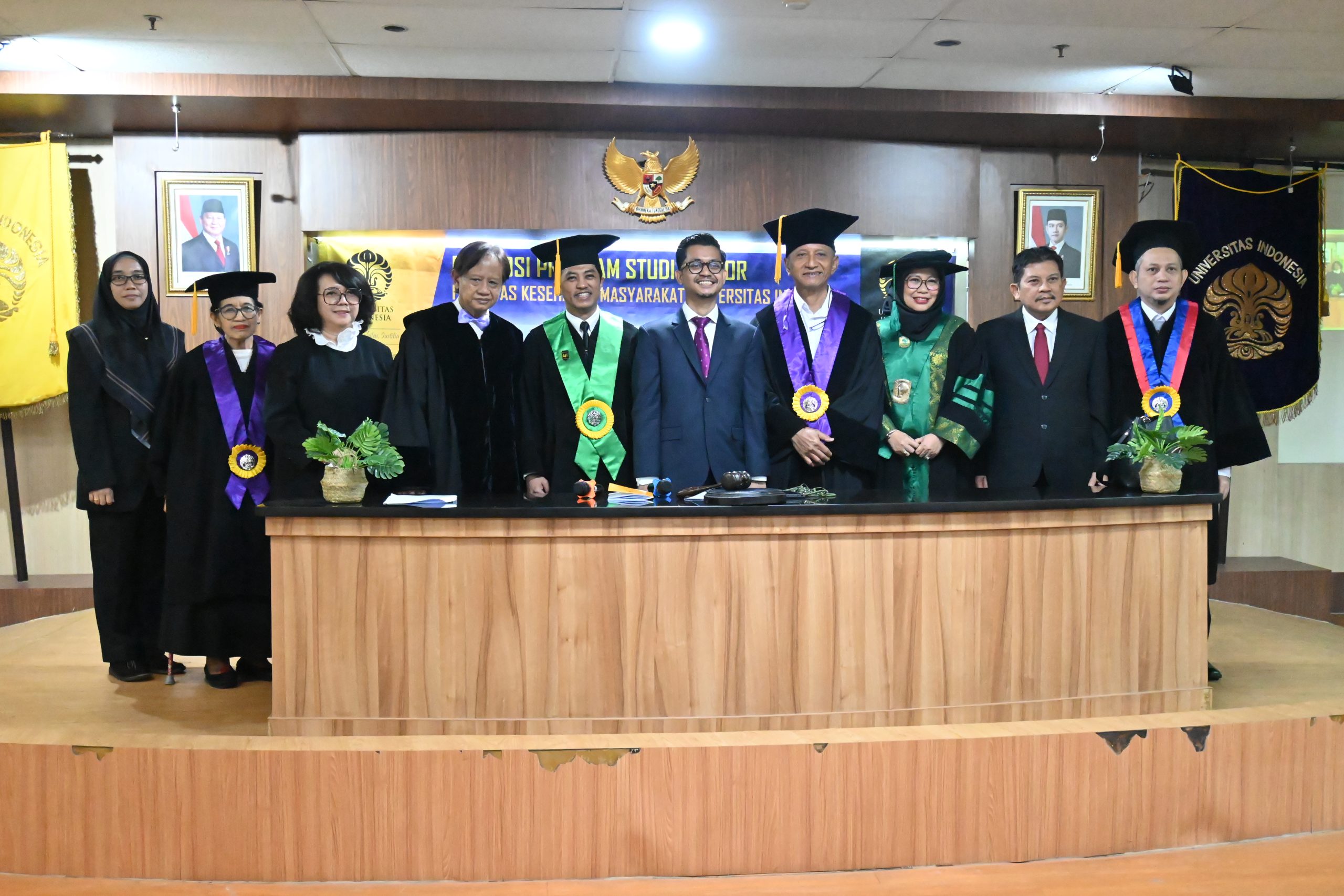The Faculty of Public Health (FPH) at Universitas Indonesia (UI) once again held a Doctoral Promotion Session as part of its academic commitment to advancing public health science. On Thursday, June 20, 2026, Aqsha Azhari Nur officially presented his open dissertation defense at the Doctoral Promotion Room, Building G, FPH UI, as a requirement for completing his studies in the Doctoral Program in Public Health Sciences at FPH UI. The session was chaired by Prof. Dr. Purnawan Junadi, M.P.H., Ph.D.
In his dissertation titled “Machine Learning Model for Screening the Risk of Type 2 Diabetes Mellitus in the Indonesian Population,” Aqsha highlighted the urgency of early screening for Type 2 Diabetes Mellitus (T2DM) in Indonesia. Based on the latest data, the prevalence of T2DM in the country has reached 11.7%, with over 70% of cases remaining undiagnosed. “The government has launched early detection programs through the Integrated Development Post for Non-Communicable Diseases (Posbindu PTM) and primary healthcare facilities (FKTP) under the National Health Insurance (JKN) scheme. However, major challenges remain, with only around 42 million out of 95.9 million screening targets reached by the Ministry of Health in 2023,” Aqsha explained.
He identified several obstacles in conventional screening approaches, including the large target population, limited resources, and low public participation. In this context, machine learning (ML) technology shows significant potential for enhancing early detection. “ML-based predictive models can process large-scale data and identify high-risk individuals more accurately,” Aqsha said. Moreover, these models can be tailored to local characteristics, making them more precise than traditional scoring methods.
Aqsha’s research aimed to develop an ML model to optimize T2DM screening in the Indonesian population, to be integrated into national programs and digital platforms by the Ministry of Health and BPJS Kesehatan. The study was conducted in three observational phases using two datasets: the PTM cohort (n=5,010) and ASIK (n=8,147,932). The LightGBM model (ASIK dataset) demonstrated the best performance with an AUC of 0.90. The top five predictors were age, systolic blood pressure, physical activity, family history of T2DM, and fruit/vegetable intake. External validation using the 2023 ASIK dataset (n=24,735,050) resulted in an AUC of 0.90, sensitivity of 0.80, and specificity of 0.80. Pilot testing in two primary health centers (Puskesmas) also showed consistent diagnostic results and high system usability (SUS score of 72.5).
These findings demonstrate that the ML-based screening model is both accurate and feasible for implementation. Practically, the model only requires five non-laboratory variables, enabling application in primary healthcare settings, especially in resource-limited areas. “This model has the potential to be integrated into national digital platforms such as SatuSehat and the JKN Mobile app, for both self-screening by the public and use by healthcare providers,” Aqsha explained. From a policy standpoint, the integration of this model is expected to strengthen national initiatives such as Posbindu PTM and JKN self-assessment programs, supporting more efficient and targeted early interventions.
Despite its promise, Aqsha emphasized several challenges in implementing the model. Data privacy is a major concern, as the model processes sensitive information such as age, blood pressure, and family history. Other issues include low digital literacy, limited technology access—especially among the elderly and rural communities—and interoperability challenges between platforms like JKN Mobile, ASIK, and SatuSehat. “Without good integration, there’s a risk of duplicated data entry or user confusion,” he stated. He also highlighted the need for adequate funding, digital infrastructure, and a shift in work culture within health facilities to support full-scale implementation.
As a recommendation, Aqsha urged the Ministry of Health, BPJS Kesehatan, and local health departments to integrate ML models into diabetes screening guidelines at the primary care level, with allocated funding and supporting regulations, including data protection policies. He also emphasized the importance of collaboration with developers of platforms like SatuSehat and JKN Mobile to enable self-screening and ensure interoperability to prevent redundant data entry. To the public, Aqsha underscored the importance of increasing awareness about early T2DM detection and improving digital literacy. “The public must also receive clear feedback on modifiable risk factors such as diet and physical activity,” he concluded.
His dedication to addressing the challenges of early diabetes screening through scientific and technological approaches earned him the highest academic distinction. Aqsha Azhari Nur graduated with a Doctorate in Public Health Sciences with a perfect GPA of 4.00 and was awarded summa cum laude. He became the 10th doctoral graduate from the Public Health Sciences program at FPH UI in 2025, the 45th doctoral graduate from FPH UI in 2025, and the 348th doctoral graduate from FPH UI overall.
During his research journey, Aqsha was supervised by Prof. Dr. Adang Bachtiar, M.P.H., D.Sc., as the main advisor, with the support of two co-promoters: Prof. Dr. Dante Saksono Harbuwono, SpPD-KEMD., Ph.D. (also Deputy Minister of Health of Indonesia), and Dr. Sri Ratna Laksmiastuti, Sp.KGA. Prof. Adang expressed appreciation for Dr. Aqsha’s groundbreaking dissertation, which presented Indonesia’s first AI/ML screening model for T2DM developed from a national dataset and externally validated with big data comprising over 20 million individuals. The model was considered practical, ready for use in primary healthcare, and highly integrable into government programs.
Also present on the examination panel were Prof. Dr. Ratna Djuwita, M.P.H.; Prof. Dr.Eng. Wisnu Jatmiko, S.T., M.Kom.; Dr. rer. medic. Dwi Gayatri, M.P.H.; Prof. Dr. Ali Ghufron Mukti, M.Sc., Ph.D.; and Prof. Dr. Rizanda Machmud, M.Kes., FISPH., FISCM., Sp.KKLP Subsp. FOMC. (DFD)

